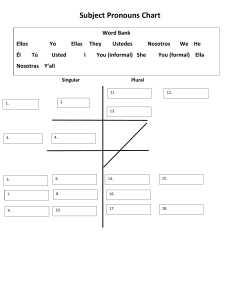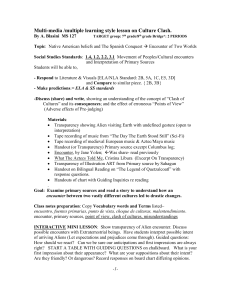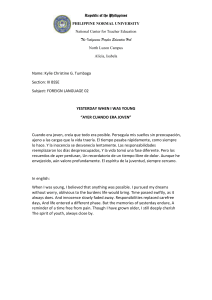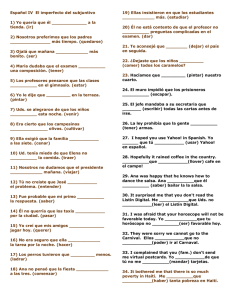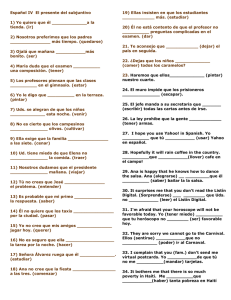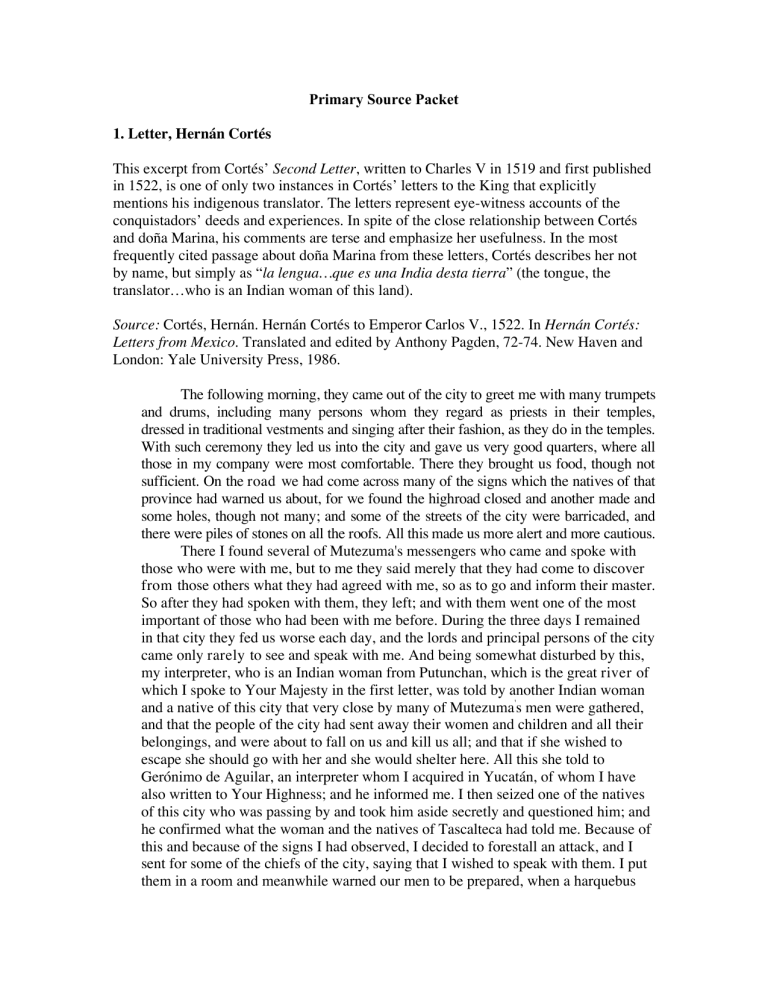
Primary Source Packet 1. Letter, Hernán Cortés This excerpt from Cortés’ Second Letter, written to Charles V in 1519 and first published in 1522, is one of only two instances in Cortés’ letters to the King that explicitly mentions his indigenous translator. The letters represent eye-witness accounts of the conquistadors’ deeds and experiences. In spite of the close relationship between Cortés and doña Marina, his comments are terse and emphasize her usefulness. In the most frequently cited passage about doña Marina from these letters, Cortés describes her not by name, but simply as “la lengua…que es una India desta tierra” (the tongue, the translator…who is an Indian woman of this land). Source: Cortés, Hernán. Hernán Cortés to Emperor Carlos V., 1522. In Hernán Cortés: Letters from Mexico. Translated and edited by Anthony Pagden, 72-74. New Haven and London: Yale University Press, 1986. The following morning, they came out of the city to greet me with many trumpets and drums, including many persons whom they regard as priests in their temples, dressed in traditional vestments and singing after their fashion, as they do in the temples. With such ceremony they led us into the city and gave us very good quarters, where all those in my company were most comfortable. There they brought us food, though not sufficient. On the road we had come across many of the signs which the natives of that province had warned us about, for we found the highroad closed and another made and some holes, though not many; and some of the streets of the city were barricaded, and there were piles of stones on all the roofs. All this made us more alert and more cautious. There I found several of Mutezuma's messengers who came and spoke with those who were with me, but to me they said merely that they had come to discover from those others what they had agreed with me, so as to go and inform their master. So after they had spoken with them, they left; and with them went one of the most important of those who had been with me before. During the three days I remained in that city they fed us worse each day, and the lords and principal persons of the city came only rarely to see and speak with me. And being somewhat disturbed by this, my interpreter, who is an Indian woman from Putunchan, which is the great river of which I spoke to Your Majesty in the first letter, was told by another Indian woman and a native of this city that very close by many of Mutezuma's men were gathered, and that the people of the city had sent away their women and children and all their belongings, and were about to fall on us and kill us all; and that if she wished to escape she should go with her and she would shelter here. All this she told to Gerónimo de Aguilar, an interpreter whom I acquired in Yucatán, of whom I have also written to Your Highness; and he informed me. I then seized one of the natives of this city who was passing by and took him aside secretly and questioned him; and he confirmed what the woman and the natives of Tascalteca had told me. Because of this and because of the signs I had observed, I decided to forestall an attack, and I sent for some of the chiefs of the city, saying that I wished to speak with them. I put them in a room and meanwhile warned our men to be prepared, when a harquebus was fired, to fall on the many Indians who were outside our quarters and on those who were inside. And so it was done, that after I had put the chiefs in the room, I left them bound up and rode away and had the harquebus fired, and we fought so hard that in two hours more than three thousand men were killed. So that Your Majesty should realize how well prepared they were, even before I left my quarters they had occupied all the streets and had placed all their people at the ready, although, as we took them by surprise, they were easy to disperse, especially because I had imprisoned their leaders. I ordered some towers and fortified houses from which they were attacking us to be set on fire. And so I proceeded through the city fighting for five hours or more, leaving our quarters, which were in a strong position, secure. Finally all the people were driven out of the city in many directions, for some five thousand Indians from Tascalteca and another four hundred from Cempoal were assisting me. Spanish Text: Fuente: Cortés, Hernán. Hernán Cortés al Emperador Carlos V., 1522. En Cartas y Relaciones de Hernán Cortés al Emperador Carlos V. Colegidas e ilustradas by Don Pascual de Gayangos, 72-74. Paris: A Chaix y C, 1866. Otro día de mañana salieron de la ciudad á me recebir al camino con muchas trompetas y atabales, y muchas personas de las que ellos tienen por religiosas en sus mezquitas, vestidas de las vestiduras que usan y cantando á su manera, como lo hacen en las dichas mezquita. E con esta solemnidad nos llevaron hasta entrar en la ciudad, y nos metieron en un aposento muv bueno adonde toda la gente de mi compañía se aposentó á su placer. E allí nos trajeron de comer, aunque no cumplidamente. Y en el camino topamos muchas señales de las que los naturales desta provincia nos habian dicho ; porque hallamos el camino real cerrado y hecho otro, y algunos hoyos, aunque no muchos, y algunas calles de la ciudad tapiadas, y muchas piedras en todas las azoteas. Y con esto nos hicieron estar mas sobre aviso y á mayor recaudo, Allí fallé ciertos mensajeros de Muteczuma que venian á hablar con los que conmigo estaban; y á mí no me dijeron cosa alguua mas que venian á saber de aquellos lo que conmigo habian hecho y concertado, para lo i r á decir á su señor; é así, se fueron después de los haber hablado á ellos, y aun uno de los que antes conmigo estaban, que era el mas principal. En tres dias que allí estuve proveyeron muy mal, y cada dia peor, y muy pocas veces me venian á ver ni hablar los señores y personas principales de la ciudad. Y estando algo perplejo en esto, á la lengua que yo tengo, que es una india desta tierra, que hobe en Putunchan, que es el rio grande (de que ya en la primera relation á V. M. hice memoria, le dijo otra, natural desta ciudad, como muy cerquita de alli estaba mucha gente de Muteczuma junta, y que los de la ciudad tenian fuera sus mujeres é hijos y toda su ropa, y que habian de dar sobre nosotros para nos matar á todos; é si ella se queria salvar, que se fuese con ella, que ella la guareceria; la cual lo dijo á aquel Jerónimo de Aguilar, lengua quo yo hobe en Yucatan, de que asimismo á V. A. hobe escrito, y me lo hizo saber; é yo tuve uno de los naturales de la dicha ciudad, que por allí andaba, y le aparté secretamente, que nadie lo vió, y le interrogué, y confirmó con lo que la india y los naturales de Tascaltecal me habian dicho; é así por esto como por las señales que para ello habia, acordé de prevenir antes de ser prevenido, é hice llamar á algunos de los señores de la ciudad, diciendo que los queria hablar,.y metílos en una sala; é en tanto fice que la gente de los nuestros estuviese apercibida, y que en soltando una escopeta, diesen en mucha cantidad de indios que habia junto á el aposento y muchos dentro en él. E así se hizo, que después que tuve los señores dentro en aquella sala, dejélos y cabalgué, é hice soltar el escopeta, y dimosles tal mano, que en dos horas murieron mas de tres mil hombres. Y porque V. M. vea cuán apercibidos estaban, antes que yo saliese de nuestro aposentamiento tenian todas las calles tomadas y toda la gente á punto, aunque como los tomamos de sobresalto, fueron buenos de desbaratar, mayormente que les faltaban los caudillos, porque los tenia ya presos; é hice poner fuego á algunas torres y casa fuertes, donde se defendian y nos ofendian. E así anduve por la ciudad peleeando, dejando á buen recaudo el aposento, que era muy fuerte, bien cinco horas, hasta que eché toda la gente fuera de la ciudad por muchas partes della, porque me ayudaban bien cinco mil indios de Tascaltecal, y otros cuatrocientos de Cempoal. 2. Personal Account, Bernal Díaz del Castillo Perhaps the most famous 16th-century portrayal of doña Marina, this description is also the most extensive from the period. Díaz del Castillo claims she was beautiful and intelligent, she could speak Nahuatl and Maya. Without doña Marina, he says, the Spaniards could not have understood the language of Mexico. These words, while evocative, were written decades after Díaz del Castillo marched with Cortés on Tenochtitlan, and thus represent both his memory of doña Marina and his reply to accounts of the conquest written and published by others. Source: Díaz del Castillo, Bernal. Chap. 22-23 in The Discovery and Conquest of Mexico, 1517-1521. 1585. Translated by A. P. Maudsley. Noonday Press, 1965. Early the next morning many Caciques and chiefs of Tabasco and the neighbouring towns arrived and paid great respect to us all, and they brought a present of gold, consisting of four diadems and some gold lizards, and two [ornaments] like little dogs, and earrings and five ducks, and two masks with Indian faces and two gold soles for sandals, and some other things of little value. I do not remember how much the things were worth; and they brought cloth, such as they make and wear, which was quilted stuff. This present, however, was worth nothing in comparison with the twenty women that were given us, among them one very excellent woman called Doña Marina, for so she was named when she became a Christian. Cortés received this present with pleasure and went aside with all the Caciques, and with Aguilar, the interpreter, to hold converse, and he told them that he gave them thanks for what they had brought with them, but there was one thing that he must ask of them, namely, that they should re-occupy the town with all their people, women and children, and he wished to see it repeopled within two days, for he would recognize that as a sign of true peace. The Caciques sent at once to summon all the inhabitants with their women and children and within two days they were again settled in the town. One other thing Cortés asked of the chiefs and that was to give up their idols and sacrifices, and this they said they would do, and, through Aguilar, Cortés told them as well as he was able about matters concerning our holy faith, how we were Christians and worshipped one true and only God, and he showed them an image of Our Lady with her precious Son in her arms and explained to them that we paid the greatest reverence to it as it was the image of the Mother of our Lord God who was in heaven. The Caciques replied that they liked the look of the great Teleciguata (for in their language great ladies are called Teleciguatas) and [begged] that she might be given them to keep in their town, and Cortés said that the image should be given to them, and ordered them to make a well-constructed altar, and this they did at once. The next morning, Cortés ordered two of our carpenters, named Alonzo Yañez and Alvaro López, to make a very tall cross. When all this had been settled Cortés asked the Caciques what was their reason for attacking us three times when we had asked them to keep the peace; the chief replied that he had already asked pardon for their acts and had been forgiven, that the Cacique of Champoton, his brother, had advised it, and that he feared to be accused of cowardice, for he had already been reproached and dishonoured for not having attacked the other captain who had come with four ships (he must have meant Juan de Grijalva) and he also said that the Indian whom we had brought as an Interpreter, who escaped in the night, had advised them to attack us both by day and night Cortés then ordered this man to be brought before him without fail, but they replied that when he saw that the battle was going against them, he had taken to flight, and they knew not where he was although search had been made for him; but we came to know that they had offered him as a sacrifice because his counsel had cost them so dear. Cortés also asked them where they procured their gold and jewels, and they replied, from the direction of the setting sun, and said "Culua" and "Mexico," and as we did not know what Mexico and Culua meant we paid little attention to it. Then we brought another interpreter named Francisco, whom we had captured during Grijalva's expedition, who has already been mentioned by me but he understood nothing of the Tabasco language only that of Culua which is the Mexican tongue. By means of signs he told Cortés that Culua was far ahead, and he repeated "Mexico" which we did not understand. So the talk ceased until the next day when the sacred image of Our Lady and the Cross were set up on the altar and we all paid reverence to them, and Padre Fray Bartolomé de Olmedo said mass and all the Caciques and chiefs were present and we gave the name of Santa Maria de la Victoria to the town, and by this name the town of Tabasco is now called. The same friar, with Aguilar as interpreter, preached many good things about our holy faith to the twenty Indian women who had been given us, and immediately afterwards they were baptized. One Indian lady, who was given to us here was christened Doña Marina, and she was truly a great chieftainess and the daughter of great Caciques and the mistress of vassals, and this her appearance clearly showed. Later on I will relate why it was and in what manner she was brought here. Cortés allotted one of the women to each of his captains and Doña Marina, as she was good looking and intelligent and without embarrassment, he gave to Alonzo Hernández Puertocarrero. When Puertocarrero went to Spain, Doña Marina lived with Cortés, and bore him a son named Don Martin Cortés. We remained five days in this town, to look after the wounded and those who were suffering from pain in the loins, from which they all recovered. Furthermore, Cortés drew the Caciques to him by kindly converse, and told them how our master the Emperor, whose vassals we were, had under his orders many to render him obedience, and that then, whatever they might be in need of, whether it was our protection or any other necessity, if they would make it known to him, no matter where he might be, he would come to their assistance. The Caciques all thanked him for this, and thereupon all declared themselves the vassals of our great Emperor. These were the first vassals to render submission to His Majesty in New Spain. Cortés then ordered the Caciques to come with their women and children early the next day, which was Palm Sunday, to the altar, to pay homage to the holy image of Our Lady and to the Cross, and at the same time Cortés ordered them to send six Indian carpenters to accompany our carpenters to the town of Cintla, there to cut a cross on a great tree called a Ceiba, which grew there, and they did it so that it might last a long time, for as the bark is renewed the cross will show there for ever. When this was done he ordered the Indians to get ready all the canoes that they owned to help us to embark, for we wished to set sail on that holy day because the pilots had come to tell Cortes that the ships ran a great risk from a Norther which is a dangerous gale. The next day, early in the morning, all the Caciques and chiefs came in their canoes with all their women and children and stood in the court where we had placed the church and cross, and many branches of trees had already been cut ready to be carried in the procession. Then the Caciques beheld us all, Cortés, as well as the captains, and every one of us marching together with the greatest reverence in a devout procession, and the Padre de la Merced and the priest Juan Díaz, clad in their vestments, said mass, and we paid reverence to and kissed the Holy Cross, while the Caciques and Indians stood looking on at us. When our solemn festival was over the chiefs approached and offered Cortés ten fowls and baked fish and vegetables, and we took leave of them, and Cortés again commended to their care the Holy image and the sacred crosses and told them always to keep the place clean and well swept, and to deck the cross with garlands and to reverence it and then they would enjoy good health and bountiful harvests. It was growing late when we got on board ship and the next day, Monday, we set sail in the morning and with a fair wind laid our course for San Juan de Ulua, keeping close in shore all the time. As we sailed along in fine weather, we soldiers who knew the coast would say to Cortés, "Señor, over there is La Rambla, which the Indians call Ayagualulco," and soon afterwards we arrived off Tonalá which we called San Antonio, and we pointed it out to him. Further on we showed him the great river of Coatzacoalcos, and he saw the lofty snow capped mountains, and then the Sierra of San Martin, and further on we pointed out the split rock, which is a great rock standing out in the sea with a mark on the top of it which gives it the appearance of a seat. Again further on we showed him the Rio de Alvarado, which Pedro de Alvarado entered when we were with Grijalva, and then we came in sight of the Rio de Banderas, where we had gained in barter the sixteen thousand dollars, then we showed him the Isla Blanca, and told him where lay the Isla Verde, and close in shore we saw the Isla de Sacrificios, where we found the altars and the Indian victims in Grijalva's time; and at last our good fortune brought us to San Juan de Ulúa soon after midday on Holy Thursday. †XXIII Before telling about the great Montezuma and his famous City of Mexico and the Mexicans, I wish to give some account of Doña Marina, who from her childhood had been the mistress and Cacica of towns and vassals. It happened in this way: Her father and mother were chiefs and Caciques of a town called Paynala, which had other towns subject to it, and stood about eight leagues from the town of Coatzacoalcos. Her father died while she was still a little child, and her mother married another Cacique, a young man, and bore him a son. It seems that the father and mother had a great affection for this son and it was agreed between them that he should succeed to their honours when their days were done. So that there should be no impediment to this, they gave the little girl, Doña Marina, to some Indians from Xicalango, and this they did by night so as to escape observation, and they then spread the report that she had died, and as it happened at this time that a child of one of their Indian slaves died they gave out that it was their daughter and the heiress who was dead. The Indians of Xicalango gave the child to the people of Tabasco and the Tabasco people gave her to Cortés. I myself knew her mother, and the old woman's son and her half-brother, when he was already grown up and ruled the town jointly with his mother, for the second husband of the old lady was dead. When they became Christians, the old lady was called Marta and the son Lázaro. I knew all this very well because in the year 1523 after the conquest of Mexico and the other provinces, when Crist’obal de Olid revolted in Honduras, and Cortés was on his way there, he passed through Coatzacoalcos and I and the greater number of the settlers of that town accompanied him on that expedition as I shall relate in the proper time and place. As Doña Marina proved herself such an excellent woman and good interpreter throughout the wars in New Spain, Tlaxcala and Mexico (as I shall show later on) Cortés always took her with him, and during that expedition she was married to a gentleman named Juan Jaramillo at the town of Orizaba. Doña Marina was a person of the greatest importance and was obeyed without question by the Indians throughout New Spain. When Cortés was in the town of Coatzacoalcos he sent to summon to his presence all the Caciques of that province in order to make them a speech about our holy religion, and about their good treatment, and among the Caciques who assembled was the mother of Doña Marina and her half-brother, Lázaro. Some time before this Doña Marina had told me that she belonged to that province and that she was the mistress of vassals, and Cortés also knew it well, as did Aguilar, the interpreter. In such a manner it was that mother, daughter and son came together, and it was easy enough to see that she was the daughter from the strong likeness she bore to her mother. These relations were in great fear of Doña Marina, for they thought that she had sent for them to put them to death, and they were weeping. When Doña Marina saw them in tears, she consoled them and told them to have no fear, that when they had given her over to the men from Xicalango, they knew not what they were doing, and she forgave them for doing it, and she gave them many jewels of gold and raiment, and told them to return to their town, and said that God had been very gracious to her in freeing her from the worship of idols and making her a Christian, and letting her bear a son to her lord and master Cortés and in marrying her to such a gentleman as Juan Jaramillo, who was now her husband. That she would rather serve her husband and Cortés than anything else in the world, and would not exchange her place to be Cacica of all the provinces in New Spain. Doña Marina knew the language of Coatzacoalcos, which is that common to Mexico, and she knew the language of Tabasco, as did also Jerónimo de Aguilar, who spoke the language of Yucatan and Tabasco, which is one and the same. So that these two could understand one another clearly, and Aguilar translated into Castilian for Cortés. This was the great beginning of our conquests and thus, thanks be to God, things prospered with us. I have made a point of explaining this matter, because without the help of Doña Marina we could not have understood the language of New Spain and Mexico. Spanish Text: Fuente: Díaz del Castillo, Bernal. Cap. 36-37 en Historia Verdadera de la Conquista de la Nueva España. 1585. Introducción y notas de Joaquín Ramírez Cabañas. Mexico City: Editorial Porrua, 1976. CAPÍTULO XXXVI CÓMO VINIERON TODOS LOS CACIQUES Y CALACHONIS DEL RÍO GRIJALVA,Y TRAJERON UN PRESENTE Y LO QUE SOBRE ELLO PASÓ Otro día de mañana, que fueron a quince días del mes de marzo de mil quinientos diez y nueve años, vinieron muchos caciques y principales de aquel pueblo de Tabasco, y de otros comarcanos, haciendo mucho acato a todos nosotros,y trajeron un presente de oro, que fueron cuatro diademas y una largatijas, y dos como perrillos y orejeras, y cinco ánades, y dos figuras de caras de indios, y dos suelas de oro como de sus cotaras, y otras cosillas de poco valor, que ya no me acuerdo qué tanto valían. Y trajeron mantas de las que ellos hacían, que son muy bastas, porque ya habrán oído decir los que tienen noticia de aquella provincial que no las hay en aquella tierra sino de poca valía. Y no fue nada todo este presente en comparación de veinte mujeres, y entre ellas una muy excelente mujer que se dijo doña Marina, que así se llamó después de vuelta cristiana. Y dejaré esta plática y de hablar de ella y de las demás mujeres que trajeron, y diré que Cortés recibió aquel presente con alegría y se apartó
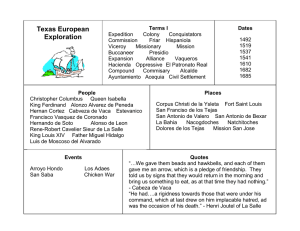
![3 war poetry wwii.CWK [v6.0]](http://s3.studylib.net/store/data/008813959_1-58f1f7d299afe9d284a6e988e1aa53fe-300x300.png)
